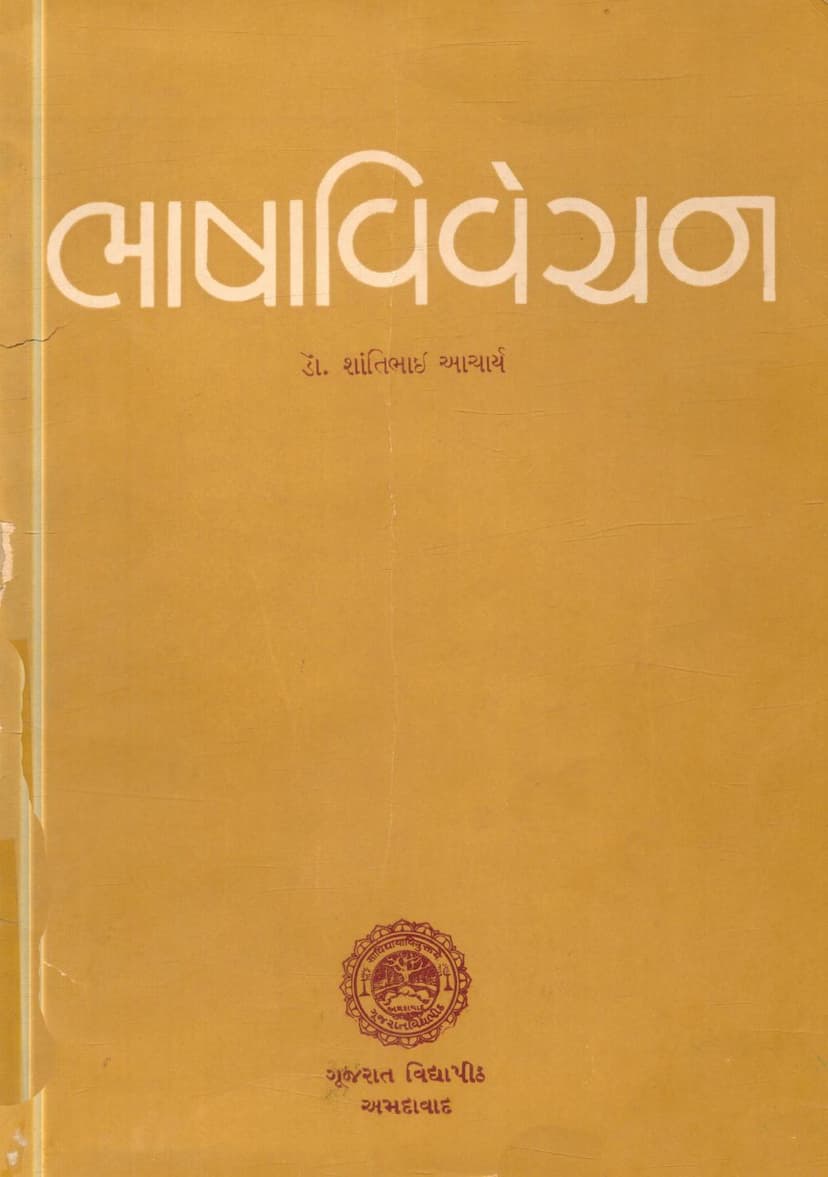Bhasha Vivechan
Added to library: September 1, 2025

Summary
Here's a comprehensive summary of the Jain text "Bhasha Vivechan" by Shantibhai Acharya, based on the provided pages:
Book Title: Bhasha Vivechan (ભાષાવિવેચન) Author: Dr. Shantibhai Acharya (ડૉ. શાંતિભાઈ આચાર્ય) Publisher: Gujarat Vidyapith (ગૂજરાત વિદ્યાપીઠ), Ahmedabad Publication Year: 1973 (First Edition)
Overall Purpose and Content:
"Bhasha Vivechan" is a collection of essays by Dr. Shantibhai Acharya that critically examines various aspects of language, particularly focusing on linguistics and language teaching. The book aims to provide readers, especially those interested in linguistics in Gujarat, with a deeper understanding of the nuances of language. It comprises reviews and analyses of important works in linguistics and language education, covering topics from theoretical linguistics to practical language teaching.
Key Themes and Chapters/Essays Reviewed:
The book is structured as a series of critical essays, not necessarily in chronological order. The essays are organized around different languages and linguistic concepts:
-
Linguistics and English Language Teaching: This section reviews a seminar held at Deccan College in 1964, focusing on the challenges and approaches to teaching English in India. It highlights the gap between language teachers and linguists and the need for their collaboration. The essay discusses the "structural approach" to teaching English, the importance of pronunciation training for teachers, the role of phonemes, and the concept of "interference" from the mother tongue. It also touches upon grammar, fluency, expression, comprehension, and the role of textbooks and examinations in language teaching.
-
Bhashavigyan (Linguistics) - Part 1 (Siddhanta Nirupan): This is a detailed review of a Gujarati book on theoretical linguistics. The reviewer, H.V. Bhayani, praises the book for its accessibility and engaging style, but critically analyzes its content. Bhayani points out several conceptual inaccuracies and superficial understandings of linguistic principles, including the distinction between sound and phoneme, the definition of language, the relationship between language and other sciences, and the historical development of languages. The review is highly critical, suggesting that the book might mislead beginners in linguistics due to its lack of rigor and clarity in explaining fundamental concepts.
-
Language and Culture: This essay likely discusses the intrinsic connection between language and culture. Although the summary of this specific chapter isn't detailed in the provided text, the title suggests a focus on how language shapes and reflects cultural practices, beliefs, and societal structures.
-
Other Essays (Implicitly Reviewed or Mentioned): The table of contents and the "Book About" section indicate reviews of other works and concepts, including:
- Integration of Language and Science in Gujarati: Suggests a discussion on how scientific concepts are presented through language.
- Kachchhi Shabdavali: An Analysis of an Analysis: This is a critical response to an article by Shri Prataprai G. Trivedi concerning the Kachchhi lexicon. Acharya defends the methodology and findings of the "Kachchhi Shabdavali" (Kachchhi Lexicon), arguing that Trivedi's criticisms stem from a misunderstanding of fundamental linguistic concepts, particularly the distinction between a sound and a phoneme, and the role of phonetic variation versus linguistic significance. Acharya emphasizes that linguistic analysis should be based on the actual usage of native speakers and objective linguistic principles, rather than personal preferences or limited understanding of linguistic terminology.
Key Observations and Critiques:
- The Importance of Linguistics in Language Teaching: A recurring theme is the crucial role of linguistics in improving language education. The book advocates for greater collaboration between linguists and educators.
- Critical Analysis of Existing Works: Dr. Acharya, through his reviews, demonstrates a critical approach to academic work. He highlights areas where authors may have fallen short in accurately explaining linguistic concepts, even in published works by reputable scholars.
- Misunderstanding of Linguistic Concepts: The review of Dr. Pandit's book and Acharya's response to Trivedi's article reveal a concern about the prevalent lack of clear understanding of foundational linguistic concepts like phonemes, phonetic variation, and the systematic nature of language.
- Role of Mother Tongue: The text implicitly acknowledges the influence of the mother tongue on learning a new language and the need to address this "interference" effectively.
- Language as a Social Phenomenon: The book emphasizes that language is not merely a set of rules but a dynamic, social institution that evolves with society.
Overall Contribution:
"Bhasha Vivechan" serves as a valuable contribution to the study of linguistics in Gujarat. It encourages a deeper, more scientific approach to understanding language and its teaching, while also offering critical insights into existing literature. The book's strength lies in its detailed and analytical reviews, which aim to clarify complex linguistic ideas and promote rigorous scholarship.